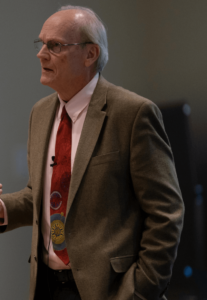Tag: Paul Gilje
“Striving to Go Backwards”: History Department Hosts Dr. Paul Gilje in Book Discussion
by The Cowl Editor on October 10, 2019
Campus

Nicholas Crenshaw ’20/thecowl
by Kyle Burgess ’21
The Providence College history department was fortunate enough to host a very special guest for lunch this past Friday, October 4 at an informal question-and-answer session held for students and staff of the department in the Center for Teaching Excellence in Feinstein Academic Center.
Dr. Paul Gilje, born and raised in Brooklyn, NY and an alumnus of nearby Brown University for graduate studies, was the George Lynn Cross Professor Emeritus of History at the University of Oklahoma. His areas of expertise include the American Revolution and the dawn of the American republic, publishing multiple award-winning books which span both eras.
Now retired from his classroom obligations, Gilje is free to explore one of his favorite periods of American history, the presidential election of 1800, or as it referred to by historians, “The Revolution of 1800.”
The significance of this election in particular was its novelty in the peaceful transition of power between two opposing political parties as John Adams’ Federalists handed the White House over to Thomas Jefferson and his Democratic-Republicans.
However, unlike most books that focus ad nauseum on the political aspect of this unprecedented change, Gilje is looking to paint a different picture from the perspective in what he refers to as “little-shot” history.
“Classroom textbooks are the result of historians in the late 19th century picking and choosing what they wanted to write about and focus on,” Gilje explained. “That’s what I like to call ‘big-shot’ history. My research revolves around people who do not feature in their writings which I refer to as ‘little-shot’ history.”
In particular, Friday’s lunch revolved around a snippet of “little-shot” history from a chapter entitled “Love, Sex, and Power” in his upcoming book about the Revolution of 1800. Gilje dives into the history of the Bingham family, one of the wealthiest clans in America at the turn of the 19th century headed up by patriarch, clandestine Patriot privateer, and Federalist Senator William Bingham.
Right in the midst of the growing feud between Federalists and Republicans on the eve of the election, Bingham found himself consumed by his own familial breakup over his daughter’s elopement with the Comte de Volney, a French aristocrat who had seduced young Maria Matilda Bingham for her father’s money after he lost his own fortunes in the French Revolution. Their scandalous marriage was soon discovered and on the lips of Philadelphia high society, much to William and his wife Anne’s chagrin.
Gilje was able to tie the young lovers’ story back into his own by explaining how William Bingham, despite his Federalist loyalties, was able to push an annulment through a Republican state legislature as men on both sides of the political aisle recognized the importance of familial patriarchy over everything else.
In addition to providing a new perspective to one of the most important eras in American history through a male-dominated society, Gilje explained that the story of the Count and Countess de Volney brings out the humanity of historical figures. “We need to talk more about sex in history,” he stated. “I don’t want people to be shocked when they read this passage and say, ‘They did that too?’”
One of the questions Gilje constantly asked himself was, “What can I access?”
The process of uncovering this Romeo and Juliet story was an arduous one. Gilje would spend much of his time scouring through newspapers and court documents within The Library Company of Philadelphia, which was founded by Benjamin Franklin in 1731.
Whereas many younger historians today use the first result from an online database word search, Gilje believed in the importance of following a trail of sources with one piece of hard evidence connecting to another in order to create an entire story to share with others. His research efforts also made the story come to life as he walked down the very same streets and past the same houses he read in his research, inspiring him in his mission to capture the moment he was researching.
The luncheon concluded with a question-and-answer session open to both students and faculty about the book, along with a variety of topics related to both history as well as Gilje’s belief in the importance of “striving to go backwards” so that we might learn from those who came before us.
